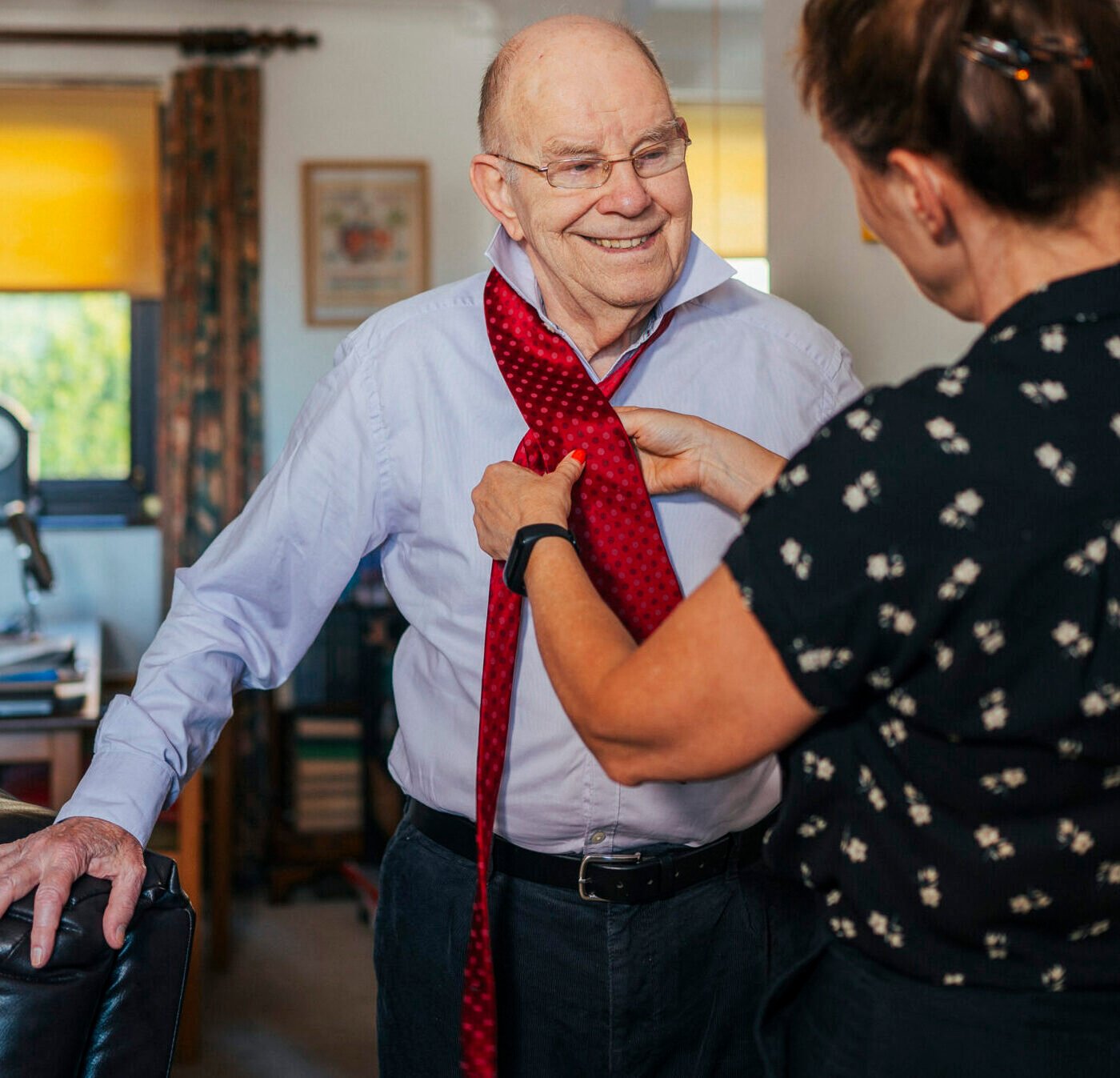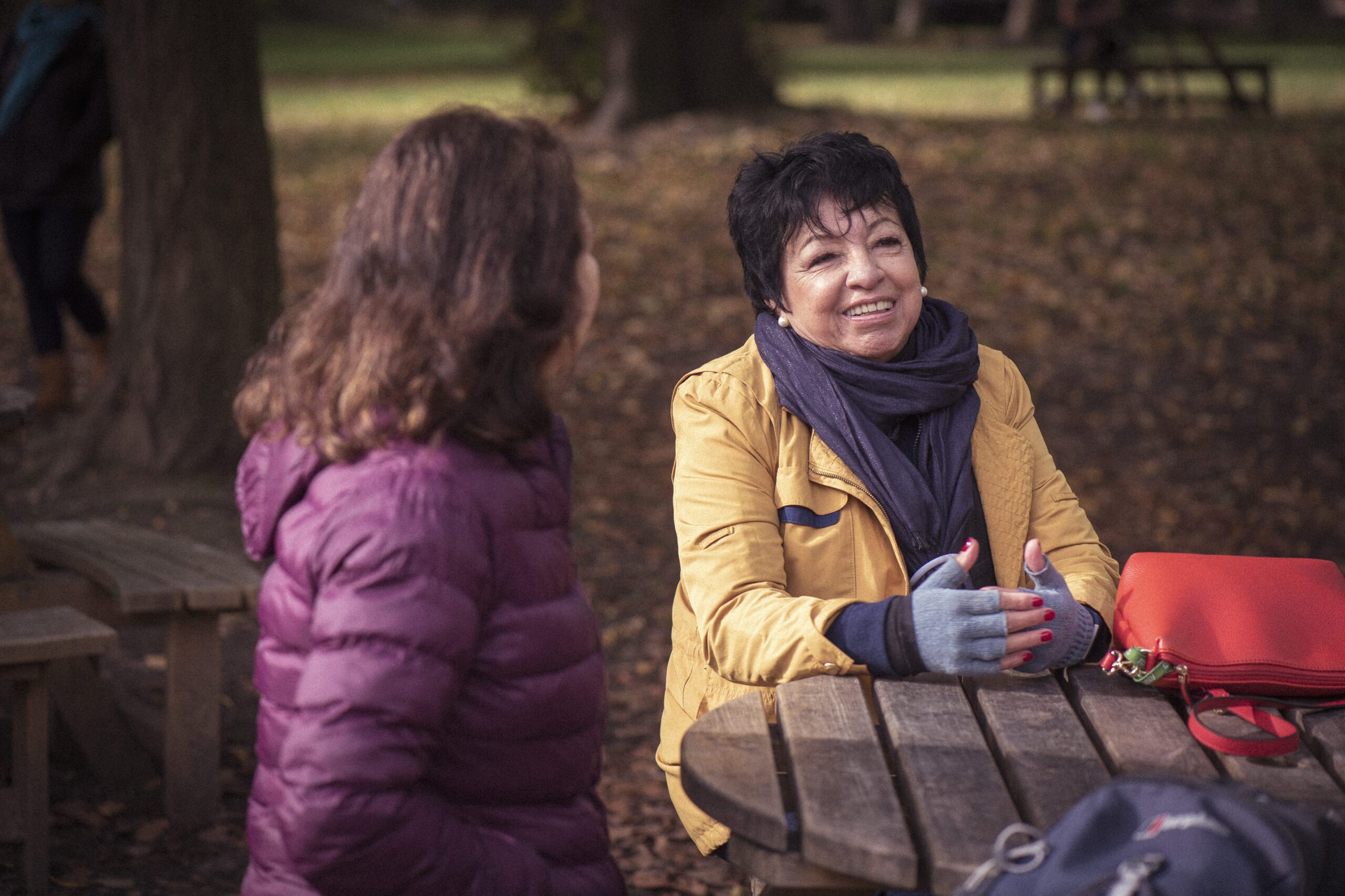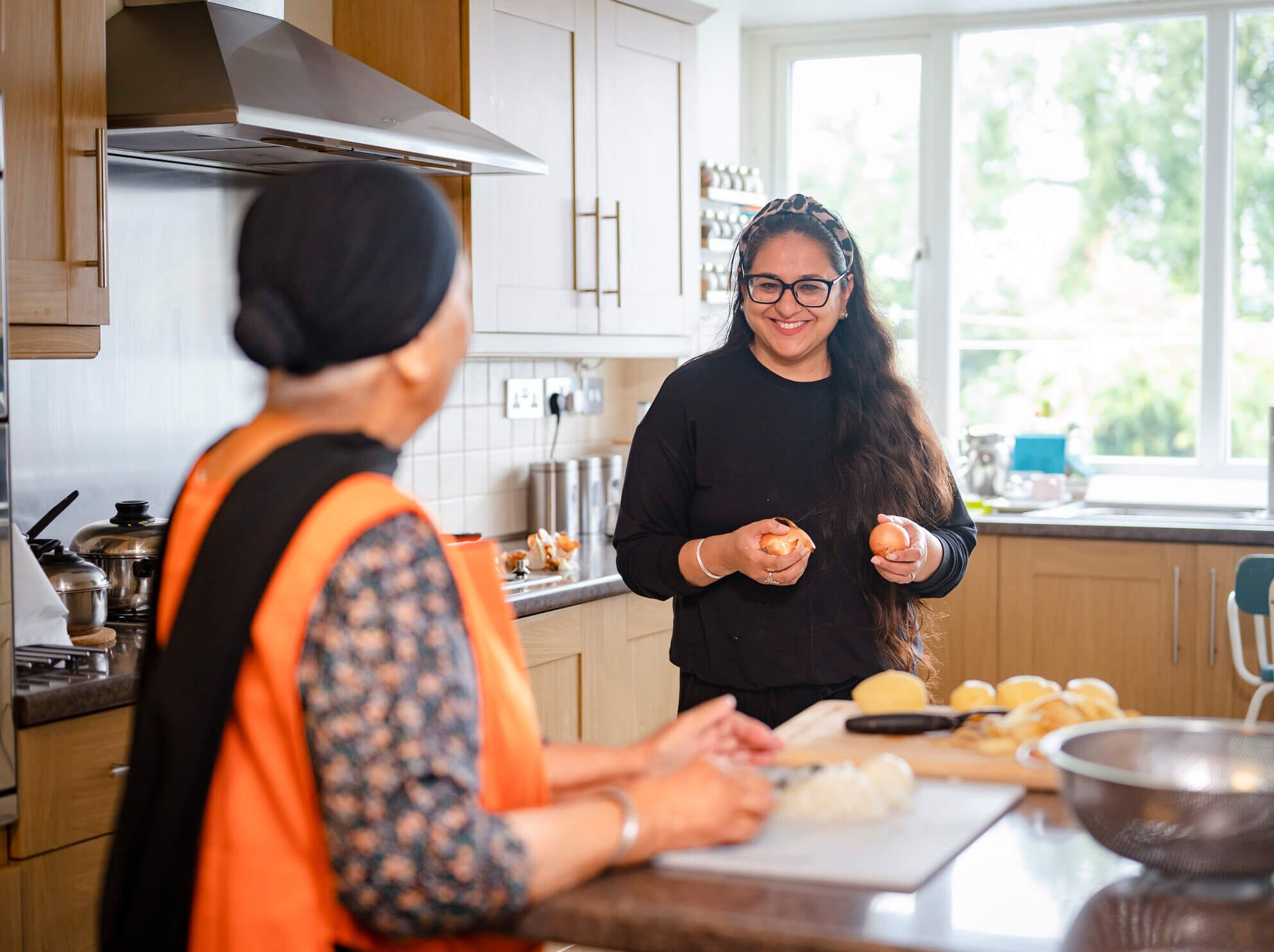Care at home for the elderly – a guide for caregivers

The role of the caregiver is more crucial than ever – according to the most recent census and data from the ONS, there are 5.7 million unpaid carers in the UK. And for those living with dementia, illness, frailty, or one of the many other challenges that come with growing older, the efforts of these carers are vital.
But for the carers themselves, it can be a tricky transition. Caring for a loved one isn’t something anyone is ever truly prepared for and most people only learn how to handle every unique situation as it arises. To help you navigate the role of caregiver and to prepare as best you can for the care journey ahead, we’ve put together some useful tips in this guide.
01 – Introduction to caregiving
Whether you have noticed that someone you care about is starting to need more assistance with daily life, have been full time caring for a family member yourself, or a loved one is recovering from a recent illness or accident, this guide will provide you information that supports you on your care journey and role as a caregiver.
4.7% of the population in England and Wales are providing 20 hours or more of care a week.
Carers UK
Caregiving can be one of the most fulfilling and simultaneously challenging roles many of us will ever undertake. The demands of balancing caregiving, immediate familial requirements and professional duties leave many people feeling incredibly stretched both emotionally and financially.
The enormous time commitment presents conflicts in its own right, from managing work schedules, taking unpaid leave and sacrificing potential wages. It may come as no surprise then, that these factors can contribute to poor mental health and carer burnout, especially where there was little choice when it came to taking on the caregiver role.
This is because the role and challenges of being a caregiver isn’t often fully understood by people who’ve not done it themselves, and those providing care can therefore often feel very isolated. We’ve created this guide as a resource to help you feel more connected and informed when providing care or choosing a care solution for your elderly parents or loved ones.
For those just starting to recognise a need for more support for their loved ones or taking the first responsibilities of caregiving, it can be a confusing time. You’ll no doubt have a lot of questions, from getting your head around what daily activities are actually required for your situation, to assessing time commitment, cost implications and where to go for assistance.
Many people who are providing care for loved ones do not consider themselves to be carers at all. Carers UK found that 51% of all carers took over a year to recognise their caring role – many often consider their care responsibility as a familial duty. However, the simplest definition of a carer as described by the Care Act is “someone who helps another person, usually a relative or friend, in their day-to-day life.”
It’s important to identify when you are in a caregiving role so that you can seek appropriate support from government by arranging a carer’s assessment, your employer, and family and friends. Start to consider care options that help you maintain physical and emotional wellbeing for both you and your loved one.
Beth Britton on caring for a loved one at 65+
When most people think of retirement, they never expect to become an unpaid carer, but with over one million unpaid carers aged 65+ in the UK, more and more people are facing their later years taking on the most challenging role of all. Beth is a Social Care Campaigner and has shared her thoughts below.Identification can be doubly important for those who are termed ‘sandwich carers’, meaning they are providing care for both older relatives and children at the same time.
Caregivers undertake a wide variety of tasks, from shopping, preparing meals, dispensing medication, organising doctor’s appointments, to facilitating leisure and social activities. Managing the requirements of daily life, particularly in cases of illness or disability, can be intimidating and uncomfortable at first.
Through their ongoing dedication and selfless contributions, caregivers enable their elderly loved ones to live as dignified and independent a life as possible.
While growing older is an inevitable part of everyone’s life, very often those who find themselves in a caregiving position did not actively take up the role, but simply find themselves in it. Because of this, the question of where to begin to tackle what can be both a physically and mentally challenging new position is key to answer.
In the next sections of this guide, we outline tips for carers that will point you in the right direction for creating a plan and for dealing with everyday tasks.
While care requirements will change over time and it’s not feasible to foresee every stumbling block you may come across, planning for the most common ones and setting out solutions will make a difference toward how well you get a handle on the stresses inherent in being a caregiver.
At the same time, the resources and strategies we outline in this guide are meant to help you cope with some of the guilt and apprehension you may be feeling, so that you can better care for your own health, and therefore will be better able to assist your loved one.

02 – Developing a care plan
Taking responsibility for the care of a loved one is an exercise in compassion, dedication and foresight. Here we explore a few tactics to get you started on creating a care plan and how to negotiate tricky discussions with a loved one who you think may need more day-to-day support.
“When it comes to caring for an elderly person, it can be hard to strike a balance between giving what help is needed and being too overbearing. Try to treat the elder in your life with as much respect as possible, and he or she will be most likely be grateful for your assistance.”
Shelley Webb, The Intentional Caregiver
Create a plan
Creating a care plan is an essential step to establish the foundations for future care that will adapt over time as the needs of your loved one changes. Even if you’re planning to take care of a loved one as a family, without outside help, having your loved ones wishes, and each family member’s responsibilities and availability in writing will help limit any miscommunication or hiccups in the coming months. Some core questions to ask right from the beginning to form a basis of the plan are:
- Who is the care recipient: an older parent, a spouse, a disabled family member or friend?
- Will the care be long-term or for a short amount of time?
- How much daily care is required?
- What type of care will the recipient need from the caregiver?
- What does your loved one want for themselves? For instance, many people do not wish to be relocated to a care home and would prefer to remain in the comfort of their own home. It’s important that you discuss this with them to ensure you are as aligned as possible on the care plan.
In addition to answering these fundamental questions, the next step in developing a care plan is to consider what your goals as a caregiver are.
While it may not be realistic for your loved one to continue living life as they have been if they are generally unwell or living with a long-term condition, it’s important to identify ways they can live a dignified, fulfilling later life and are treated with compassion.
Honesty is the best policy
Having an honest, frank conversation with your loved one about their expectations and your capacity as a caregiver early on in the relationship can make a big difference to the future.
The first care plan you make should be seen as just an initial step – it has to remain flexible and should be reevaluated at regular intervals. While there are many unknowns in caregiving, it’s certain that circumstances will change over time, so be prepared to evolve your care plan every few months, or in some cases as frequently as week to week, if your loved one’s condition is altering quickly.
Over time and with more and more experience, you may discover that you need some extra help from professionals or additional family members in order to maintain your own quality of life and your family’s wellbeing, as well as, of course, your loved one’s.
This could be anything from daily grooming, preparing meals, administering medication, paying bills, or home maintenance. You may also wish to seek the advice of medical professionals or other experts for their opinion when making care decisions to gain the benefit of their experience.
Whatever solution you decide upon, it’s important to check in regularly and to plan as far ahead as possible for any circumstances that may affect your care arrangements. And don’t forget to be realistic with yourself – it will take some trial and error to adapt to your new role as a caregiver and to acquire the skills needed to handle all types of situations that will arise.
You should never feel guilty if you need to take a break, there is always the option of respite care if you require some well-earned time to recharge.
Unsure how to start the care conversation?
Setting caregiving goals
Due to the nature of being a caregiver, you will no doubt experience a range of emotions toward the person you’re caring for. At times it’ll be easy to be patient and compassionate in your day to day interactions, whereas at other times it may feel overwhelming or impossible. For this reason, many people in your circumstances find it useful to write down a list of goals to help guide their role as a caregiver when the going gets tough.
These goals may be as simple as demonstrating random acts of kindness such as preparing a favourite meal once a week or taking a walk in the park together with a beloved pet. Or it could be ensuring that your loved one is able to have a say in their daily schedule.
Many elderly people express concern about being a burden to their families or discomfort with being treated like children as they get older. Including goals such as independence or self sufficiency on your caregiving list and ensuring that your loved one remains as social and active as possible, can help to overcome this common issue.
Starting the care conversation with your loved one
While it may seem apparent to you or family members that your loved one needs the assistance of a caregiver, it may not be so obvious to your loved one. Initiating the care conversation can be tricky, and an older person’s concerns are often rooted in fear of losing control, of becoming a burden, or of being uprooted from their own environment as is the case with residential care homes.
Opening a dialogue by reassuring your loved one that you’re open to listening, are keen to understand their wishes, and want them to be as in control of their own life as possible, is a good place to start the conversation around care.
A good way to start the discussion is to simply ask your loved one what they believe would help their situation. For example, say “I wonder if you need some help with ____?”
If your offers of assistance are refused, you may wish to seek another opinion from your loved one’s trusted friends, other family members, doctor, or elderly care specialist, who may carry more influence in this area.
Talking about personal finance or health can be difficult in the best of circumstances, turning this around to be in a forward looking situation rather than a pressing problem can be an effective tactic for discussing care options, especially for those who may wish to shy away from this type of sensitive topic. However, it’s also key to speak honestly and not to make false promises even though it may be convenient at the time to manage difficult emotions.
Finding a mutually agreeable solution will likely not happen instantly, so be prepared for multiple discussions between you, your loved one, and family members. Make sure to fully research the options available to you and include the care recipient in the vetting and decision making process.
"A little empathy and positivity can go a long way toward convincing your loved ones to get the help they need. Make sure that your loved ones know that your requests are heartfelt and that you want them to be as happy and healthy as possible."
Victoria, Elder clinical team
Caring for someone at a distance
In situations where you aren’t able to live close to the person you care for due to work or family commitments, it’s considered long-distance caregiving.
As a long-distance caregiver, you may be supporting a loved one by doing things like –
- Offering regular support and companionship over the phone.
- Helping manage bills, benefits, or banking.
- Arranging meals on wheels or grocery deliveries. managing the person’s bills and benefits
- Reminding them of medical appointments and arranging lifts or taxis
- Prompting them to run errands or order repeat prescriptions
- Arranging for a friend, neighbour or carer to pop in, and keeping updated of any changing needs.
While millions of people are remote caregivers, this comes with its own set of challenges.
For instance, being far away can make it harder to have the foresight required to anticipate care needs or to deal with any problems that may arise in the course of daily caregiving. If you are in a remote caregiving position for a loved one, you may consider the following tips for long-distance caregivers useful for overcoming the mileage gap between you.
Plan for regular visits
Visits should be planned several weeks in advance, and where possible arranged for workdays rather than weekends, so that you can work with your loved one to catch up on and arrange any outstanding appointments, errands, or household admin tasks that you can support with.
A visit is also a good chance to get a gauge on how your loved one is coping with the way things are. For example, take a look at whether food is being stocked in the kitchen, the cleanliness of the home, whether monthly finances like utility bills and council tax payments are being taken care of, and of course that the overall health and wellbeing of your loved one has not deteriorated.
Set up a support system
As you aren’t able to be there all the time, make sure that someone who is, such as a close friend or neighbour, has a set of keys and is familiar with the medical alert systems you’ve put in place for your loved one in case of emergencies. One idea is the use the message in a bottle scheme, where you leave a bottle / container with essential personal and medical information in an obvious place – usually on top of the fridge. Speak to the friend or neighbour consistently at an agreed time so that you’re checking in at regular intervals and can be alerted to any small details that may be a sign something’s not right.
Whenever you speak with them, it can be helpful to keep a diary of key moments, such as if they’ve missed a meal, or forgot something – this can help provide a clear picture to any doctors looking after your loved one if they require medical attention. Also write down the names of the people you’re speaking to, this may include caregivers, medical professionals, or anyone else involved in the care for your loved one, and compile a list of any required actions so you can follow up.
If you need additional assistance, there are a number of excellent services like The Silverline, who exist to provide support, friendship calls and direct to services for older people. For a list of different charities and organisations that can offer companionship, house calls, or help with errands, take a look at our guide to befriending.
The local council in your loved one’s area should also be able to direct you to support services too. While AgeUK has a comprehensive directory of regional support services – from at home help to social activities and day centres.

03 – Managing daily care needs
The role of caregiver is at its core a series of day-to-day tasks to help the person you’re caring for live a safer, more comfortable and dignified life. Whether it’s light activities such as dressing or shopping for food, or more continuous care at home that is required.
It is sadly unsurprising that an estimated 1.6 million people aged 65+ have unmet needs for care and support. An alarming percentage of people are either not receiving any help with basic tasks like getting in and out of bed, using the toilet and eating, or they are receiving help that does not meet their needs.
Age UK,The State of Health and Care of Older People, 2023
Mobility and getting around
The key to achieving a sense of well-being, and one of the most common issues caregivers face, is making sure that the person they are caring for is mobile. While getting outside, taking part in exercise, or enjoying social activities with friends may not always be possible, for many people, maintaining the ability to move around both inside the home and outside can instil a greater sense of independence.
Restoring or easing the ability to get around offers a much-needed change of scenery and can improve the overall mood and demeanour of the care recipient, which can in turn, make the job of caregiving easier.
The first place to start when assessing options for boosting mobility is with your loved one’s doctor. For example, is the best course of action to start a gentle exercise programme, or to use a walker, wheelchair, stairlift, or other device? A doctor may also assess any medication that may help or maybe causing drowsiness, pain, or dizziness that could impede mobility.
It may also be beneficial to enlist the help of an occupational therapist. Occupational therapy is free through the NHS – you can ask for a referral from your loved one’s GP, or speak to their local social services.
An occupational therapist will usually review following:
- What can the person do? – what are their strengths, and where might they need help.
- What’s their environment like? – Will specialist equipment or adaptations to their home help them stay safe and independent?
- What does daily living look like? – What do they need and want to do each day? How can these tasks be made easier?
If a reduction in mobility is due to a chronic condition such as Parkinson’s disease or multiple sclerosis, a doctor can also advise you on how to prepare for any future changes you should be aware of.
Protecting against falls and accidents in the home
Many older people are fearful of falling to the extent that they avoid exercise and other potentially enjoyable activities, which can actually have the opposite effect of weakening bones and muscles due to immobility. It’s widely known that falls and fractures are major causes of serious injury for older people, so it’s important to take steps to ensure the home is safety-proof to prevent injury.
Falls account for an astonishing 75% of injuries in older people. In fact, nearly one in ten people say they, or an elderly relative, have stopped washing daily due to fears around falling or injuring themselves.
Falling Up, Household Injury and Falling in Later Life report
Evaluate the home for potential problem areas
Loose stair carpet, low lighting, or clutter such as electrical cords or throw rugs are all potential hazards to safeguard against in your loved one’s home. Installing motion-sensitive lights, nightlights, and safety equipment like strong railings on staircases, grab bars by the bath, anti-slip mats or a shower chair in the bathroom can be very helpful.
For cupboards that store frequently used items, especially those that are higher or may be hard to reach, placing a grasping tool nearby can be useful, rather than needing a stepladder or other potentially risky device. Or consider working with your loved one to rearrange how and where they store things – moving essential items to waist height.
Monitor health and encourage exercise
Maintain regular appointments and conversation with your loved one’s doctor to set up an exercise programme aimed at strengthening muscles, and improving flexibility and coordination to protect against falls. Also make sure that any medication isn’t impairing balance or causing dizziness that can lead to accidents in the home.
Simple exercises like stretching or light yoga that can be performed every day can be very helpful for the body as well as improve the mood and overall happiness. In addition to the GP, make sure your loved one is getting regular eye exams, has suitable eyewear and wears sensible rubber-soled shoes with good traction, all of which can prevent accidental falls and injury.
Meal preparation and diet
It’s common for older people to eat less than they should, which can lead to vitamin deficiencies and other health problems caused by inadequate nutrition in the elderly. Fortunately, planning and eating meals with your loved one can be both good for their physical health as well as a positive way to connect and share time together.
Whether you are preparing meals yourself, with your loved one, or with the assistance of a carer, make sure that the kitchen is safe and that the environment is adapted for their situation. For those living with dementia, Dementia Care UK offers a room-by-room guide for making the home safer and dementia-friendly.
Preparing home-cooked meals together can be a rewarding experience that offers the opportunity for quality time with your loved one and a chance for them to participate in the activity of making their favourite meals.
Here are a few pointers that may make the meal preparation process easier:
- Safeguard – organise the kitchen so that common items are accessible and within easy to reach. Choosing easy-to-open food containers, large print cookbooks and special eating utensils suitable for those living with dementia will make meal preparation more manageable.
- Plan ahead – Create nutritious meal plans with your loved one, and shop ahead. Whether you source healthy recipes from friends, your loved one’s doctor or simply from the internet, there are hundreds of ideas for easy to prepare, nutritious meals for the elderly available. Many supermarkets now also offer delivery services, which can make shopping for frequently used or heavy items more convenient.
- Batch cook – Many meals, like soups or stews, can be easily stored and heated up later, so make extra portions to be frozen now and eaten in the future.

04: Hygiene, bathing and personal care for the elderly
Personal hygiene and grooming are among the most intimate of daily activities, something that all of us will have done for ourselves since our teenage years and that become more challenging as we age. These tips can help to make keeping up with the regular routines of bathing and self-care more manageable.
Bathing
It can often be challenging or sensitive to start to assist your elderly loved one with their personal hygiene routines. However, maintaining good hygiene is incredibly important for health, avoiding infections, skin issues and overall comfort.
Mobility issues may have an impact, making it harder or even hazardous for them to bathe themselves in conventional bathrooms with the potential for slipping or getting stuck. Arthritis may make holding showers, products or even handrails tricky, and conditions such as depression or dementia may affect their motivation, independence or ability to keep up bathing routines.
Needing help in this area can be stressful and embarrassing for a loved one – and approaching a solution must be done with dignity in mind. Having a frank and open conversation around this issue with them is important, if possible.
In this way you can find out what they are concerned about, what their needs are and how best to support them. Allowing them to express their wishes – and adhering to them where possible will also mean that they can feel empowered in a sensitive situation.
Some older people may find it preferable to have a carer help with their bathing and toileting functions – removing the need for close family members to be involved in this area of personal care.
As such you can work with them to decide on a bathing schedule that meets their needs. In terms of frequency, an older loved one with a fairly sedentary lifestyle may not necessarily need a shower every day, as an active younger person would, instead they might opt for a daily sponge bath and a shower or bath three times a week instead.
By consulting with your loved one you can also find out what their preferences are for a shower or bath, to wash morning or night and their favourite, familiar toiletries. These seemingly ‘small’ things can make all the difference – and can be incorporated into the care plan where safe to do so.
Allowing your loved one to maintain as much of their self-care as is safely possible is important. While grooming tasks may take a little longer to complete, they are an essential part of maintaining their independence along with live-in care in their own home.
And for all aspects of self-care there are simple tips that can make things easier for an elderly relative. For example, something as simple as switching to a short or easy to manage haircut could allow your loved one to be able to do their own hair and an electric razor might allow a man who cannot safely shave with a blade to continue having control over his grooming.
“Aging parents and their children are often in denial that there is a problem until they notice things out of the norm in the everyday living environment. Poor personal hygiene is a sign that Dad or Mom may need help. Daily living tasks sometimes get to be too much as we age, and it’s important for family members and loved ones to step up and address the problem when this happens — even if it is difficult or painful. The problems will not go away and usually need to be addressed in a timely manner. Bathing and grooming is one of the roles many caregivers need to assume.”
Dr. Melissa Henston, A Place for Mom expert and geriatric psychologist
Safety first
An assessment of potential hazards should be made when making the transition to assisted bathing.
Things to consider include the possibility of slipping and falling – it may be necessary to install handrails or a shower seat for example, if your ageing relative has poor balance or finds it difficult to stand. You will also need to put non-slip mats on the bath and shower floors. Age UK has a range of products designed to help safer bathing – and can also help with questions about and provision of adapted bathrooms. For our beginners guide to bath aids, click here.
Think about installing a hand-held shower if your loved one doesn’t have one in a bathtub or a shower, as it is often easier to manoeuvre than a fixed shower head. In turn this will help ensure that products are thoroughly rinsed off so their skin does not become irritated. And remember, even the smallest details make a difference – a bar of soap in a bathroom can be a far more dangerous slip hazard than a foam based soap in a pump dispenser for example.
Scalding is another danger – elderly loved ones, especially those with dementia, may be unable to tell you if water is too hot or cold so it’s vital to test the temperature at regular intervals before and while bathing them. Health professionals often recommend bathing in water thats only a few degrees warmer than body temperature.
Also consider access – if your loved one can be left alone in the bathroom safely it is vital you’re always able to get in in case of an emergency – removing locks and putting “in use” signs on the door instead may be one option to consider.
Assisted bathing made easier
It’s vital to keep calm and positive and make the situation of assisted bathing as neutral as possible. Things that may help reduce the awkwardness and embarrassment include playing music in the background and keeping up relaxed conversation while bathing. For many elderly people, holding a towel around themselves is also a way to maintain their dignity during the experience of being washed by another.
“Talk positively and be sensitive towards the person when discussing how you feel about bathing them. Reassure them that, despite it being a very personal activity, you are happy to help. Ask how they feel and what they would prefer,” suggests the Alzheimer’s Society. “Try to find as many ways as possible to help them remain independent, and offer support as unobtrusively as you can.”
In short, maintaining a relaxed manner, regardless of how you might actually feel, is essential. If you show anxiety or embarrassment you will most likely make your loved one feel the same way – and it’s for this reason that many family members opt to arrange home care, such as live-in care rather than take on this delicate and difficult interaction themselves.
For elderly people with dementia there may be even more specific considerations – some may be scared of the sound of running water, for example, and if so then the carer should run the bath before they are brought into the bathroom. Others may be suspicious of getting into a bath if they cannot work out where the water has come from. Again, a professional carer can work with you to develop a routine that works for them, and deal with any issues that may arise around fear or reluctance to bathe.
Caring for older skin
Older skin can be dry and very delicate and needs careful attention. It’s important to make sure that they are clean under any skin folds, where bacteria can grow if left.
These include the folds of the breasts and stomach, neck and genitalia, all of which will also need rinsing thoroughly to avoid skin irritation and careful drying to avoid fungal infections. For those who don’t like shampoo on their face, products such as ‘shampoo shields’ and washing trays from chemists and specialist websites can help.
Incontinence is a common issue amongst the elderly, and while it may not be a subject many would be willing to broach, if your loved one has problems controlling bowel or bladder functions, it’s even more crucial to maintain their personal hygiene or else run the risk of developing infections. In addition, sometimes elderly people, especially those with dementia, will also need prompting to wash their hands after using the toilet.
Clean from top-to-toe
While bathing doesn’t necessarily need to be an everyday routine, attending to teeth, beard and hair does – and again these are routines that your loved one can often continue with in some cases, with helpful modifications.
For example, elderly people can be encouraged to take care of their nails by themselves for as long as they can – and may find that this is more enjoyable done while watching television or listening to music.
The most important thing, particularly with oral hygiene, is that the attention is regular and consistent. As we age saliva (which helps to clean teeth) decreases, which means the mouth is more vulnerable to tooth decay and infection.
According to the British Geriatrics Society, poor oral health can have a devastating impact on overall health and well-being, causing pain and making it difficult to speak, eat and take medication, and leading to dehydration and malnutrition. As such, elderly people need to brush night and day and see their dentists every six months to check dentures for proper fit and gums for signs of gums disease.
An electronic toothbrush can make brushing easier and more effective, as can a mild mouthwash. If your loved-one has trouble holding the toothbrush then a carer can help – either attaching the brush to their hand with a wide band, or by manually helping them to brush their teeth.
A clean, well-kept head of hair is a powerful way to raise the spirits and everyone likes to look their best, no matter what their age. Again, it pays to be realistic – a daily wash and blowdry is not feasible aim for an elderly person, but hair care can be supported between washes with products such as dry shampoos or no-rinse shampoo caps.
All products should be considered in terms of safety and ease – baby shampoo is a gentle way to clean hair without the worry of it stinging if it gets into eyes or no rinse shampoos and leave-in conditioners may be a good solution.
If your elderly relative cannot leave the house then mobile hairdressing services can always be booked to come to them at home – something that will not only keep their hair in good shape, but can be an enjoyable social appointment.
Moving to assistance with grooming and hygiene issues can be challenging for an older person, but with the right care and a careful assessment of safety and your relative’s needs and wishes it’s possible to both keep up good hygiene and levels of personal grooming – and allow them to maintain the dignity they’ve always had.

05: When your loved one needs more care
Sometimes in spite of the best intentions, you may find that you need additional support to provide the best level of care for your loved one. Luckily, there are many more types of care available today than even a decade ago, which mean that care doesn’t need to be as emotionally or financially distressing as you may initially believe.
Assessing your situation and researching the options in order to make an informed decision can be stressful – this guide is here to help you feel prepared and make more informed decisions.
“Most long-term caregivers have times where the fatigue and frequent frustration of providing care for a vulnerable person can border on burnout. Being proactive is one of the best ways to combat potential burnout.”
Christine M. Valentin, Licensed Clinical Social Worker
How can care help?
Being a caregiver is hard work, particularly in cases of dementia, progressive illness or other disability. It’s important to realise that you don’t have to take on the responsibility of caring for your loved one on your own.
Arranging appropriate professional care means that you, your loved one, and your family can feel secure and supported.
Perhaps all that is needed is someone to pop around and ensure your loved one is ok – in which case hourly care may be the most appropriate option. However, if they have more extensive needs, the right kind of care will be crucial in providing you the peace of mind that they are safe and comfortable at all times, living in the comfort and familiarity of their own home and local community.
Professional live-in carers are experienced in looking after people with a wide variety of needs, and many are also trained to deal with the requirements of medical conditions such as dementia.
A carer will ensure that all day-to-day functions are covered for your loved one, helping with everything from domestic responsibilities to toileting, getting them in and out of bed, reminding them to take medication and ensuring safety around the house.
They will also offer 24/7 assistance, including a comforting presence at night – so you will have peace of mind that your loved one is being fully looked after at any point.
The presence of a friendly face is a powerful and positive addition to an older person’s world. Regular contact is essential for a happy, healthy life. Yet loneliness is one of the biggest challenges for a growing ageing demographic in this country. Age UK estimates 1.4 million older people in the UK are often lonely. There are a lot of people out there who just aren’t speaking to people for weeks on end.
By offering dedicated help, 24/7, a live-in carer becomes more than practical support. They also become a companion, even a friend, offering daily conversation, contact and continuity that can be invaluable to your loved one.
How much care is needed?
To provide basic levels of care – for example, help with light housework, help preparing breakfast, or getting dressed – an hourly carer may be all that’s needed. Hourly care has less continuity than live-in care, as it’s hard to guarantee that the same carer will visit each day. This may be unsettling for some people. As the parameters of this kind of care are fixed and timed, it is rarely adequate for those with greater care requirements.
Those with more extensive care needs or who are living with a condition such as dementia, usually need to have someone around at all times to ensure their safety and your peace of mind.
If your loved one is frail and at risk of falling or wandering and getting lost, for example, then putting the appropriate care in place before anything happens is a better approach than waiting for the worst to happen before addressing the situation.
There are a few different full-time support options to consider –
Assisted living –A person lives in a self-contained flat with their own front door, but staff are usually available up to 24 hours a day to provide support.
Live-in care – involves a professional carer moving into the home of the person they’re caring for. They’ll remain with them round the clock, helping them to stay in their own home, living as independently as possible, for as long as possible.
Residential care – involves moving into a residential home with other people, to receive support, and benefit from other things such as planned activities and trips, freshly prepared meals and housekeeping services.
Nursing care – Nursing homes provide care for those with more acute needs. They are staffed with registered nurses and care support workers.
How Elder live-in care can help
Engaging a live-in carer provides you with the security that someone is around 24/7 to keep an eye out for both their mental and physical wellbeing.
Live-in care also provides valuable continuity – your loved one will have one or two dedicated carers, and the flexibility to adapt and personalised the care to suit their changing requirements over time.
Financially, too, live-in care makes sense, when you consider that the full fee is going towards the dedicated care itself, and not also covering catering, utilities, or property maintenance fees that are included in care home fees.
Savings can be even greater if a carer is supporting a couple in their own home – another benefit over care homes, as it allows people to stay together as they grow older, even if one has extensive medical needs.
For a no-obligation chat about your situation, speak to one of Elder’s care advisors on 0333 920 3648. We speak to many people every day and are always available to provide guidance and resources on everything from where to go to arrange funding, to finding the most suitable care option, and agreeing as a family.
Balancing care and a career – interview with the BBC’s Egon Cossou
Producer and presenter Egon Cossou combines a busy job at the BBC with caring for his mother, who is blind, at her home in Edmonton in north London. We talked to him about the joys of reconnecting with cherished parents in later life, the difficulties of combining the needs of two different lives and why the word carer is one he baulks at.Read more care guides

The Elder care jargon buster – 49 care terms and their meaning
Like every sector, social care has a lot of its own terminology which can be difficult to get your head around, especially if you’re facing

What is a carers assessment?
Caring for an elderly relative is not always easy, particularly if you have a job and a home of your own to run. The carers

Help for caregivers – accepting support from others
Just because help is available to caregivers, doesn’t mean it’s easy to accept. If you or someone you know is caring for a loved one,